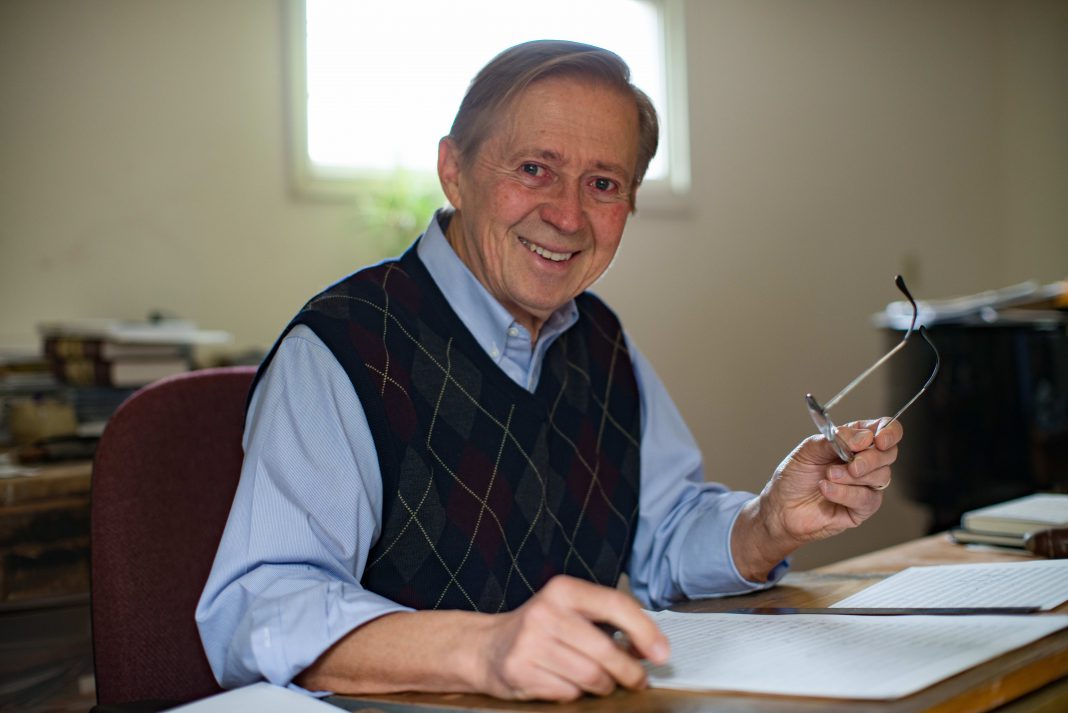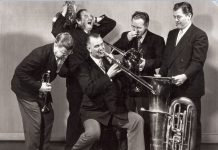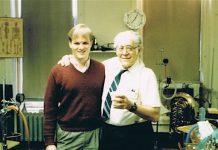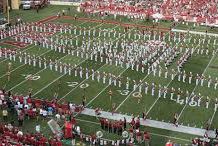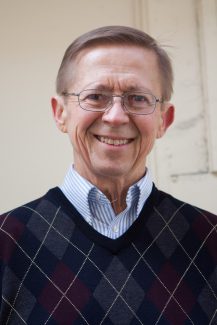
On August 7, 2017, the Wind Band World lost a monumental composer and voice, David Maslanka. My first exposure to David Maslanka’s music was in 1991 at the CBDNA convention in Colorado, where David was presenting a session on A Child’s Garden of Dreams. Needless to say, at the same convention, I was too afraid to introduce myself to an “infamous composer”. Who even knows “why”? It was little to my knowledge that this person, composer, would become such a close friend and colleague as I embarked on a journey through his musical compositions and a journey that lead me to learn more about myself as a conductor, musician and human being.
I have been fortunate enough to have the privilege of working with David many times with the University of Utah Wind Ensemble and the Utah Wind Symphony, not to mention our impromptu breakfasts at Midwest, meetings in New York with Mark Morette, and our impromptu visit to the “Grotto” in Oregon together to find peace.
First Encounters and Working with David Maslanka
The first time that I had David Maslanka visit the University of Utah, was to perform his Symphony 8. Through two rehearsals, I learned a great deal from David. His calm demeanor and his encouraging advice – it was never about David Maslanka – it was always about the MUSIC. As I reflect back on my early encounters with David, I remember asking him how much I should slow down or how the ensemble should pause. He always smiled and said, “You’ll know how much”. He instilled in me to trust your players. You and them will know how long to pause, or where the music needed to go in the phrase.
I remember the many times that he would address the ensemble and talk about ‘getting into your sound’. What does that mean? Get into your sound. Find your sound as an ensemble and as musicians – creators of the music. He would then give that type of downbeat gesture to the ensemble and it was always this magnificent sound. Each time he did that I always said to him “You did it again – you found their sound”. He would always reply with a smile, “They just need to find it”.
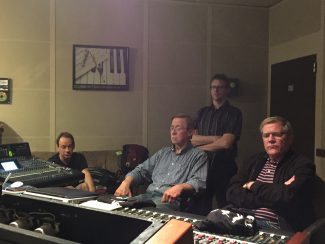 David was very strict about his tempos. He wanted them where he intended them to be. I learned this working on his compositions, especially his Symphonies. If you didn’t hit the metronome markings, later on in the piece it would come back to haunt you. It was all about pacing – and letting the work breathe. When rehearsing the Clarinet Concerto, we had taken the Dance a bit slower, and the first thing David did was stop and say – push yourselves, go at the tempo as I had written the movement. David always had this distinct way of calmly tapping you on your shoulder when he wanted you to stop and allow him to address the ensemble. The “Tap-Tap-Tap” would always stay the same, in slow soft sections or fast powerful moments.
David was very strict about his tempos. He wanted them where he intended them to be. I learned this working on his compositions, especially his Symphonies. If you didn’t hit the metronome markings, later on in the piece it would come back to haunt you. It was all about pacing – and letting the work breathe. When rehearsing the Clarinet Concerto, we had taken the Dance a bit slower, and the first thing David did was stop and say – push yourselves, go at the tempo as I had written the movement. David always had this distinct way of calmly tapping you on your shoulder when he wanted you to stop and allow him to address the ensemble. The “Tap-Tap-Tap” would always stay the same, in slow soft sections or fast powerful moments.
There was a colleague in the Utah Wind Symphony that asked me, “Doesn’t it make you nervous to conduct the composer’s music when the composer is right behind you?” My answer was very short, “No”. I embrace the opportunity. David was never intimidating –or nerve-racking to work with. I always cherished every moment that David could enlighten me with his comments. Was he demanding of the performances of his music, “You bet”, but it always brought the best out of everyone. It was a spiritual experience for everyone to work with David on a higher level of music making.
In its inaugural season, the Utah Wind Symphony was looking for a special piece to end the season with. I had always loved David’s Symphony No. 4, but financially UWS was not in a position to rent this work. Myroslava, the Music Librarian at that time wrote David an introduction about UWS and his input on programming and he responded with the following,
Dear Myroslava,
Thanks for writing to me. I am very excited and pleased to hear of the birth of the Utah Wind Symphony. There is so much good music for winds that it is time for this repertoire to make the leap to a general audience. I am honored that Scott chose “Give Us This Day” to be part of your first concert.
I would certainly like for you to perform my Symphonies. The one I would recommend first is Symphony No.4. The premiere performance was in 1994, followed by the first professional performance (Dallas Wind Symphony – Jerry Junkin) the same year. It has become an audience favorite in Dallas and has been brought back at least three times. Understanding your financial situation I would like to help you as much as possible. All of my Symphonies are rentals from Carl Fischer, Inc. I don’t know the exact rental fees, but they vary with the piece, and none are cheap. No.4 is the shortest and the least expensive. How much money do you have available to rent a piece like No.4? I would be happy to ask Fischer to give you a reduced price, and if necessary to donate the use of the music. I believe that your musical undertaking is extremely important, and I am pleased to offer my support.
Please give my greetings to Scott Hagen. We had a powerful time with my Symphony No.8 two years ago at U of U, and it would be wonderful to work with him again at some point.
All best,
David Maslanka
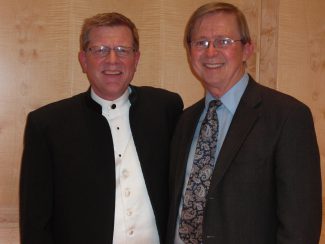 David ended up working with the publisher on a reduced rental rate, he suggested that they keep his royalty for the work and bill him for anything that was left over. David graciously paid the remainder of the bill and donated his time and travel for the performance. He also waived his appearance fees stating, “I think it would be wonderfully ironic for me to donate the use of the music, and then ask for an appearance fee!” During our rehearsals David again touched all of us. He was so insightful with his comments and pleased with the work we had accomplished. I remember him tapping me on my shoulder with 45 minutes left of rehearsal saying “That will be enough.” Needless to say, I was surprised but he assured all of us that the group was ready for the performance. The concert was very moving and fantastic.
David ended up working with the publisher on a reduced rental rate, he suggested that they keep his royalty for the work and bill him for anything that was left over. David graciously paid the remainder of the bill and donated his time and travel for the performance. He also waived his appearance fees stating, “I think it would be wonderfully ironic for me to donate the use of the music, and then ask for an appearance fee!” During our rehearsals David again touched all of us. He was so insightful with his comments and pleased with the work we had accomplished. I remember him tapping me on my shoulder with 45 minutes left of rehearsal saying “That will be enough.” Needless to say, I was surprised but he assured all of us that the group was ready for the performance. The concert was very moving and fantastic.
When I drove David to the airport after the residency of Symphony No. 4, I asked him why he donated his music and wanted to come for the concert? His reply was “I knew this group was going to be very special and I wanted to contribute to its mission of making great music.” The UWS continued working with David through the years performing On This Bright Morning at the Midwest Clinic in 2014 and recording a CD entitled “Hymn for World Peace”, The Music of David Maslanka Volume 3. The music of Maslanka gave Utah Wind Symphony a special meaning, and they forever changed because of what David had done for the ensemble.
Fun Stories with David Maslanka
This leads us to well, some fun stories with David Maslanka – that as a friend I couldn’t help but share. When David visited Salt Lake City, the first few times we didn’t know each other very well. Yet as time passed, I got to know David as a friend. Pretty soon, David was comfortable staying at the “Hagen Inn”. His first visit, we had asked David if he had any allergies, and he responded, “We have three dogs, five cats, three horses – no allergies.” Each time he came to SLC, it was more than having a composer around – it was having a close friend and confidant. David would spend time talking and sharing stories – – yes about his ranch, animals “donkey”, and family – – – but also sharing his philosophies on spirituality. He got to know the dogs very well, and cooked his own breakfast. He even taught us how to make a perfect omelet by adding a “touch of water”. He became more than a composer, he became family. Once we asked David what else he “required” in his guest room, and he said “Well I will need a desk, so that I compose if I am here any length of time.” That should tell you that, David Maslanka, felt at home in Salt Lake City. At one point, David called and asked if Alison (his wife) could stay with us overnight as she transported a horse to her daughter’s home in Arizona. Now, this was a trip – – just imagine “Hagen Inn” (already 3 dogs) with two more and a horse trailer! It was absolutely fantastic getting to now know Alison and her work with Body Talk.
Myroslava and I would try to take time and show David around Utah during his trips here. One trip I remember is walking the streets of downtown Park City. He absolutely had a fantastic time. There was a store called the “Sacred Heart” which sells spirituality books and items. It was in that store that we listened to some Tibetan singing bowls and he found two books for Myroslava and myself. The one for me was The Way of the Shaman – and for Myroslava, it was Breathe: You Are Alive. Both of these books were meant to bring light in different aspects of our lives.
Traveling was David’s career. Myroslava and I were fortunate enough to be able to meet David on a few of his adventures. One of which was in the state of New York. We were in New York to edit the Maslanka Volume 2 CD by the U of U Wind Ensemble – we found out that he happened to be in town for a premiere of “Hymn for World Peace” written for Clarance High School in New York. We ended up finishing edits for the CD and invited David to come to the studio to listen to his creation. It was a life changing experience to have the David listen to the final product. I will never forget him listening to Lament (Clarinet Concerto) with tears in his eyes, and after the movement ending, we asked if he wanted to listen to Dance, and with a pause we listened to the rest of the concerto. David approved of the recording of the Clarinet Concerto, and told us to share it with the world.
The other was when we had made a trip for Myroslava to perform the Clarinet Concerto in Portland. David had met us there for a residency, and it was absolutely fun. We explored the area together and went to The Grotto, which is an outdoor shrine and sanctuary located in Portland. It was great to be able to take a walk with David and enjoy time of peace together.
Now – let’s figure out – when David traveled so much – how did he find “home” in the places he traveled. Being that I spent some time with David in Utah, and other places I learned very quickly what brought “home” to him. They were very simple items – as he really didn’t require much. It was frequently going to the grocery store when he could. David loved to cook, and when he traveled he liked to stop at Whole Foods, or Natural Grocers to pick up a few items. He always just made himself at home with breakfast, or anything that he needed. The next thing was Green Tea – his favorite. We would always try to find David green tea when possible. There was a time where he fancied “Awake” tea, yet Green Tea would always come back. Walking – David always liked to take a walk –whether it was in Park City or in Oregon we always felt centered after a great walk together.
Symphony No. 10
Now, to David’s most recent work– a work that he will never have heard in person – yet a work that was very dear to him, his final Symphony. Symphony No. 10 was co-commissioned by myself, and Stephen Steele. Following the commission of the Clarinet Concerto, I had the idea to continue working with David on his music, and initiated a consortium for his final work. The consortium got off to a slow start, yet with the involvement of Stephen Steele, we were able to fund the work. The University of Utah Wind Ensemble students will begin their preparations on the premiere and recording of Symphony 10 in March of 2018. Obviously, this will be a bittersweet experience, yet the knowledge having worked with David previously makes me confident that I will be able to create a performance and recording that he would approve of. Symphony No. 10 was premiered on April 3, 2018, at the University of Utah School of Music in Libby Gardner Hall.
Maslanka’s Impact on Utah’s Band Programs
Throughout the years, as I have had David in town, I have tried to bring him into High School programs that were working on his music. Two students of mine at the time – Dan Chaston and Brek Mangelson-have been impacted by David in their musical careers. I think it is important to not only share my first-hand experiences with David – but the impact he has made in our state.
Dan Chaston at Viewmont High School had David work with his ensemble on On This Bright Morning. Dan stated that “David’s soft-spoken demeanor forced us to listen carefully as he unfolded an entirely new real of musical understanding I had no idea existed. He changed everything I knew about music.”
Brek Mangelson at Westlake High School also had the opportunity to work with David Maslanka on Give Us This Day. Brek stated that, “David gave tremendous insight into the composition and how the students could improve to express his intent.”
David not only worked with these two bands and directors, but with numerous band directors and students throughout the state of Utah. He left a “foot print” that will not be forgotten.
Explore his Music!
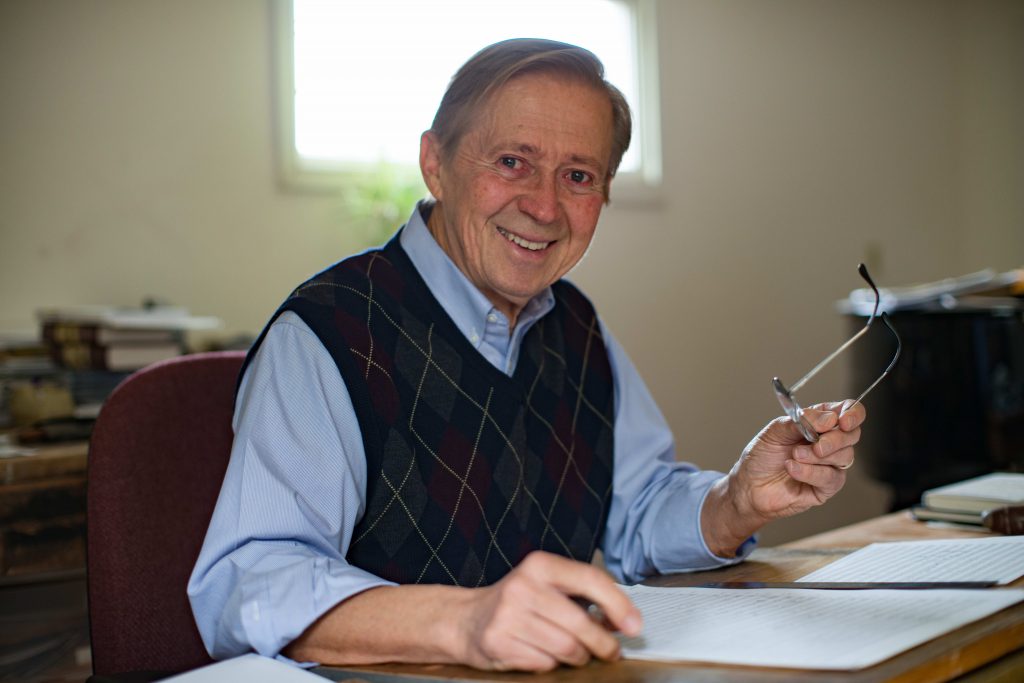
If you, as a conductor of a wind band in the State of Utah haven’t experienced David’s music, you should really take the time and do some research. David’s music is not only challenging, yet very accessible. There are many works that can be programmed for your ensembles from Junior High through College. Through these works, not only you, but your students will grow as musicians and human beings. Take it upon yourselves to visit www.maslankapress.com and just listen. Listen!
I will always miss my conversations with David Maslanka and our visits together, yet I will always remember the “Tap – Tap – Tap” on the shoulder. So, David if you wouldn’t mind, please tap us on the shoulder every once in a while to remind us to take time and breathe.

